Was 2012 a good year for women in the movies?
1 January 2013

 This is ultimately a glass-20%-full question.
This is ultimately a glass-20%-full question.
I have now re-read A.O. Scott’s NY Times Magazine piece, “Topsy Turvy,” several times — a piece that leads with the subtitle, “this year, the traditional Hollywood hierarchy was overturned. Heroines ruled.” I want to know exactly how he came up with that subtitle, because I don’t think the article supports it. Nor does the evidence.
Now, I have seen a lot of really good films this year — films that feature terrific female leads, stress women’s experience in fresh ways, highlight gay/trans characters, and are sometimes directed by women. Just scanning over this list makes me feel encouraged. Scott particularly mentions some of these: Brave, The Hunger Games, and Beasts of the Southern Wild. Let us not forget, too, the box office success of The Twilight Saga: Breaking Dawn Part II and Snow White and the Huntsman, two films that give me less encouragement but which nevertheless get women into the equation.
Four of those movies — four! — were among the 15 highest-grossing films of 2012. This is very good, for when Hollywood sees female-oriented or -directed films earning big bucks, it’s more likely to fund future projects.
But let’s not forget those other top-grossing films: the endless stream of supremely dudely fare like Ted, The Hobbit, and the superhero business in which women play the most conventional roles of all: The Avengers, Skyfall, Amazing Spider-Man, and so on. I give Anne Hathaway props for her role in The Dark Knight Rises but she remains only an interesting twist on the usual female suspects in such vehicles.
If I say this was a good year for women onscreen (and behind the camera), is that impression based solely on a perceived slight uptick from the usual — which is that women get fewer leads, fewer lines, a smaller range of interesting parts, and far less opportunities to write and direct than men? Is this glass 20% full, or 80% empty?
When I look back at 2012 I see new levels of schizophrenia about women in public life. When Lena Dunham’s HBO series Girls was released, she was attacked on all sides. Jennifer Lawrence was termed too fleshy for the role in The Hunger Games. But movies & TV were only the tip of the iceberg. Let’s not forget the public schizophrenia outside the world of film. Sandra Fluke’s public flogging at the hands of Rush Limbaugh; the massive troll campaign against cultural critic Anita Sarkeesian, who sought to scrutinize gender in video games; the revival of anti-birth control measures; unnecessary trans-vaginal ultrasounds required of women seeking abortions in Texas and (almost) Virginia; the crazy anti-woman, anti-gay GOP platform during the 2012 election; the public whack-job discussion of rape by prominent Republicans running for office.
Of course, those two politicians lost. But ladies, you’re wrong if you think this is the end of efforts to ban abortion altogether or to humiliate women who seek sexual and political equality. Let’s not kid ourselves by thinking that Hollywood doesn’t reflect that schizophrenia, at least on some level.
Was this year better than last year for women in film? Tough call. Last year had Bridesmaids, The Help, Girl with the Dragon Tattoo, and Bad Teacher (oh yeah, and another Twilight) all near the top of the list of highest-grossing films, plus all those amazing foreign and independent films that delighted me during my La Jefita Awards. And hello, The Iron Lady. Maybe I can say 2011 and 2012 were equally interesting years for those of us willing to seek out and draw attention to the topic.
Most important is the question, do these two strong years indicate a change in emphasis in Hollywood? Well, no. Sure, Pixar finally gave us a female lead in Brave. Does that mean they’ll have another one soon? I doubt it. We’ll get more Hunger Games, but we’ll also get more superhero fare in which women are negligible and/or tokens. Will Cannes allow even one single female director into competition? It’s a crap shoot; that film festival didn’t have a single female director in 2012. It looks good that Kathryn Bigelow will get nominated for Best Director at this year’s Oscars. But is that really a sign of a shift?
The best I can hope for is that we have a third good year for women in a row. But when I say good, I don’t mean that opportunities for women/ gay/ trans peoples are improving in big ways. It’s a fragile thing, this good year designation. The ever reliable Stacy L. Smith of USC’s Annenberg School, who crunches these numbers all the time, simply terms women onscreen “sidelined, sexy, and subordinate” and doesn’t dicker with minute distinctions.
Let’s just say that we have little evidence to trumpet a “Hollywood hierarchy was overturned” narrative, Mr. Scott. But I’m hoping for a good year in 2013 anyway — and by good, I mean that it’ll look a teensy bit better than 2012.
Perhaps you’re thinking to yourself: she’s watching films like Magic Mike and Ted? Mainstream comedies in regular theaters oriented to general audiences?! Has this blog been hijacked by an evil-minded imposter?
(I admit: in retrospect it appears that watching Ted at the theater goes against all my principles. All I can say is that my friends chose it.)
But I must defend my anticipation of Magic Mike — because it’s being eagerly anticipated by so many of my favorite gay and/or female film critics, including Louis Virtel’s videos The Weeklings:
[Sidebar: I’m relatively new to The Weeklings, but I have now scanned about one-third of these 2- to 4-minute videos and they’re so quick-witted that sometimes you have to watch the videos 2 or 3 times to absorb everything. To wit: the episode in which Louis Virtel takes issue with moron Adam Carolla’s views on whether women are funny. Or when he proposes to do a proper interview with Anderson Cooper about coming out — his list of questions is genius! “How do you feel about forcing straight kids to come out as uninteresting?” Or when he joins the rest of his troupe, The Gay Beatles — oh, the episode in which they explain which Beatle they would be … which leads them to explain which member of Sex and the City they would be, or which Cosby Kid, or which Fanta Girl….]
But back to the issue at hand: Magic Mike. Because I believe it is my duty as a woman — nay, as a human being — to hand over my money to see a film about male strippers. I fully expect that within a few days’ time, I will be back reporting that Magic Mike is, indeed, the Citizen Kane of male stripper films.
I confess: that is not my line. It really belongs to film critic extraordinaire, Libby Gelman-Waxner.
My most secret and powerful desire might be to get paid to write film reviews not just with a nom de plume, but an entirely made-up persona like hers. When I was in college I discovered Gilman-Waxner’s genius reviews in Premiere magazine. She is a middle-aged wife of a dentist, mother, suburban New Yorker, and buyer for the juniors department (also: “she” is secretly screenwriter/ humorist Paul Rudnick). She’s always spot-on with her criticism, like when she describes Daniel Craig in Girl With the Dragon Tattoo: “He wore reading glasses, which on a dreamy guy like Daniel are the male equivalent of a nurse’s uniform or a schoolgirl kilt.” In short, Libby is the perfectly melded combination of gay man and straight woman.

Tanning salon-driven dramatic tension in the dressing room between Channing Tatum and Matthew McConaughey — but over what? I can hardly wait!
That’s the real secret, you see: Magic Mike represents the sweet spot where the interests of people like Libby Gelman-Waxner, The Weeklings, and Feminéma converge. Libby and I agree that there’s basically zero chance I will not enjoy this movie. Moreover, it is SO much fun to anticipate seeing it. I mean, just listen to her imagine the possible plot points:
And I’m praying that one guy is stripping his way through medical school, and that another guy gets drunk and falls off the runway, and that finally all of the strippers pull together and become a family and strip to rebuild a local orphanage, and that someone declares, “We’re gonna help those kids because, dammit, that’s what male strippers do.”
I mean, what’s the worst that can happen? I walk out and say, “The dancing was awesome, but it wasn’t gay enough.”
Want to know what I concluded after seeing it? Here’s the answer!
Here’s the thing about Best-of-the-Year lists: people like me haven’t seen half the motherfucken films because we live in Regular America, where they dribble great indie films out to us as if they’re rare commodities that only goddamn Newyoricans and Angelenos get to see.
This is too bad, because I’ve just invented the soon-to-be-coveted La Jefita statuette, to be awarded sparingly and only in person by me to artists of my choosing.
When I finally get a crack at these films of which I have heard so much good stuff, I have a big plan for categories of:
- Best Feminist Film (will it be Girl With the Dragon Tattoo??)
- Best Female-Directed Film (once I get the chance to see We Need to Talk About Kevin and Pariah, dammit)
- Best Female-Oriented Film (will it be Poetry?? or will Hanna or The Lady edge it out? is it even possible I could see Kenneth Lonergan’s Margaret??)
In my heart of hearts, I’d also like to add far more idiosyncratic categories like:
- Most Feminist Period Drama That Avoids Anachronism
- Sexiest Scene in Which a Woman Eats Food
- Best Fight Scene in Which A Woman Kicks a Man’s Ass
- Most Realistic Dialogue That Women Might Actually Say
- Best Role for a Veteran Actress Who Is Not Helen Mirren or Meryl Streep
Stay tuned on that one. I have to gird myself for controversy.
Only one award is ready to be given: BEST ACTRESS! Because no other performance by an actress can possibly beat out Joyce McKinney — as herself — in Errol Morris’s Tabloid.
She’s amazing! Is she BAT-SHIT CRAZY or BARKING MAD, the way one tabloid journalist portrays her? or a hopeless romantic, which is how she describes herself (and how she seems to have lived her life)? Does she really have a genius-level IQ? What really happened in that cottage in Devon in 1977? And who’s been threatening bloggers like me with lawsuits ever since the documentary was released?
Joyce McKinney is riveting, beautiful, clever, and unforgettable. I don’t care if it was a documentary: McKinney is playing the part of McKinney, and she’s doing it brilliantly.
Congratulations, Joyce — you are the first-ever winner of Feminéma’s marble La Jefita statuette!
“The Girl Who Played with Fire” (2009)
7 August 2010
As during most summers, I haven’t found much more than a few films that pass The Bechdel Test — that is, a film 1) with two or more women in it, 2) who talk to each other, and 3) about something other than a man. In fact, even some of the best ones pass only by a slim margin, like “Winter’s Bone” … and that was pretty far-flung from summer movie fare.
But then there’s “The Girl Who Played with Fire,” the second installment of the Swedish film trilogy version of Steig Larsson’s three-volume Millennium series that has sold cadrillions of copies worldwide. Look, don’t get the wrong idea: this film is inferior to the first one, “The Girl with the Dragon Tattoo,” and it gives only short shrift to some of my favorite parts of the novel, like Lisbeth’s relationship with Miriam Wu. But c’mon, it’s a hot summer and our critical defenses are down, as we’re tacky with sunscreen and eager for a couple of cool hours inside a blessedly dark theater. Saintlike, the brilliant character of Lisbeth Salander is fighting our battles for us, veering back and forth between her unparalleled tech savvy in hacking computers and kicking the asses of bad guys ten times her size.

For me, the character of Lisbeth addresses head-on a lot of the problems I have with our otherwise limited range of female action heroes (and here I’m also thinking about recent comments by Snarky’s Machine and Anita Sarkeesian of Feminist Frequency). She’s gay, she’s an intensely focused computer-smart researcher, she’s come through a horrific childhood of abuse, she’s barely 5 feet tall, and she doesn’t dress in clothes that send anyone mixed messages. Her fury against men who hate women isn’t played for comic effect with a series of great one-liners; in fact, she’s very often silent, like the laconic heroes of old Westerns. When her father abused her mother one too many times when Lisbeth was 12, she set him on fire. She doesn’t try to get anyone to like her — and if there’s any message we can glean from this film, it’s that people like and trust her anyway. Thinking about these things out loud is like Alison Bechdel articulating her Bechdel Test for films: once you think about it and realize how few characters do much more than confirm men’s ideas about what makes a sexy or compelling woman, you want to become Lisbeth yourself.

Like I say, I’m not going to make any claims about the high quality of this film, which in some ways is a placeholder for the final film, “The Girl Who Kicked the Hornet’s Nest” (2009), which still has no release date set for the U.S. — a shame, as next year we’ll be subjected to David Fincher’s American remake of the first film, starring Daniel Craig as the muckraking journalist (depressed sigh). The novels become increasingly focused on Lisbeth as they go along, and this film mirrored that tendency, delightfully. As we left the theater last night, we burbled about all the parts of the novel that can’t help but make that final film better than this one. As we wait for it, let’s all channel a little Lisbeth the next time that male colleague waits for you to laugh at his joke, one of those offensive Jim Beam commercials pops up on TV, or you feel a racial tension headache coming on from the latest right-wing nutbag ideas about repealing the 14th Amendment to the Constitution. Ladies, turn on your computers and brush up on your kickboxing: your skills may be needed soon.

Queer eyes and smart girls
11 April 2010
…in which I think about smart objects of desire and girls’ willingness to identify with both boys and girls.
I used to have a crush on Jon Stewart, but for a long time now it’s been Rachel Maddow. Exemplary of her crush-worthiness is when she interviewed J. D. Hayworth — the conservative Tea Party opponent of John McCain in the upcoming AZ Republican primary — who’s been making a lot of political hay reviving the gay marriage “problem.” The homophobic Hayworth claims that the Massachusetts Supreme Court defines marriage as “the establishment of intimacy,” and argues that such a definition leaves open the possibility that men will marry horses:
Maddow: “Where in Massachusetts law or in the Supreme Court ruling does it say, ‘the establishment of intimacy?’ I read, spent the whole afternoon sort of looking for that, and couldn’t find it anywhere.”
Haworth: “The high court in Massachusetts defined marriage in a rather amorphous fashion, simply as, quote, ‘the establishment of intimacy.’ Now, I think we all agree there’s much more to marriage than that.”
Maddow: “Sir, I’m sorry, it didn’t.” (Goes through every example of the use of “intimacy” in the decision and MA state law and shows it doesn’t appear.)
Hayworth: “Well, that’s fine. You and I can have a disagreement about that.”
Maddow: “Well, either it’s true or it isn’t. It’s empirical.” (Hayworth stumbles and fumbles on his way out of the interview.)
Me, fawning: “Rachel, will you marry me?”
It’s not just that Maddow speaks truth to power, like Stewart did on “Crossfire” back in 2004; it’s the brevity and lucidity of her comments like “it’s empirical” that make me go mad for Maddow. (Plus, obviously, she takes no prisoners, likes cocktails, speaks frequently of her partner Susan, and is a geek). But then I have a long history of wanting to be with smart girls, wanting to be them, wanting to do them, wanting to watch them. It’s baffling to me that, according to received wisdom, men only want to watch men. (Cheers to all those actual men out there who feel the same way I do about smart women.)
Smart girls are hot. Lisbeth Salander (Noomi Rapace) in “Girl with the Dragon Tattoo”; Kima Greggs (Sonja Sohn) from “The Wire”; Jane Tennison (Helen Mirren) from the “Prime Suspect” series; Sybylla Melvyn (Judy Davis) in “My Brilliant Career.” They’re hot because they don’t need to please men; indeed, much of the time they’re smart enough to do without them altogether.
One of the problems I keep circling as I write this blog is that according to popular culture, men are the privileged readers/viewers: they avoid women’s films and “chick lit.” Women will read/watch everything, but men only read/watch stuff by/about men. Because of this, it’s no surprise we have Harry Potter rather than Hermione Granger as the main protagonist. I remember reading Lloyd Alexander’s The Book of Three aloud to a ten-year-old girl who unabashedly identified with both male and female characters. When Scott O’Dell wrote Island of the Blue Dolphins in the 60s, he had to fight to keep the protagonist a girl. (Never mind that it was based on a true story, or that he won the Newbery Medal and other prizes — the important point, from a publisher’s perspective, is he didn’t sell as many copies as he might have otherwise.)
In a different mood, this might be the opening for me to denounce the sidelining of women authors and women characters — and the concomitant emphasis on all those male buddy films, the fact that children’s shows have three male characters to every one female character (according to the new Geena Davis Institute on Gender in Media), “The Frat Pack,” and all things Judd Apatow, in which men bull-headedly just don’t get women, and engage in a lot of fag and fart jokes.
I’ll keep denouncing those things, to be sure. But for the moment I’m struck by something else: the fact that, in essence, female reader/viewers learn what you might call a queer view of self. I think women learn to see the world with queer eyes, a perspective that holds the possibility of allowing women simply to enjoy looking at women in a non-male-oriented way altogether. The problem comes when women simply channel this toward making themselves attractive to men — but I think that if we can teach them to emulate the smart girls rather than the Playboy bunnies, we might see this queer view as really pretty subversive.
Now, Rachel: please cover women’s issues more.
“Girl with the Dragon Tattoo” (2009)
9 April 2010
This film, like Steig Larsson’s book, serves up satisfying feminist retribution to the men who hate women. And I’m probably that viewer the filmmakers dreaded: someone who walked into the theater with a lot of trepidation, way too familiar with Larsson’s Millennium trilogy of books and worried that the film would be too literal or not faithful enough (aka the Harry Potter dilemma). Count me as officially relieved, then, that they did a good job of selecting the right parts to put into this 2½-hour film, leaving out only (and sadly) most of the twisty-turny corporate corruption narrative. They found the right guy to play the muckraking journalist, Mikael Blomkvist (Michael Nyqvist): homely and decidedly middle-aged, his face a bit sunken by gravity and acne scarring. Most of all I fretted that they would have played the character Lisbeth Salander as a gorgeous sexpot hiding behind her goth makeup and piercings. Noomi Rapace is the perfect movie rendition of Salander — not so skinny and withdrawn as in the book (some of whose characters even wonder whether she’s autistic or brain damaged). Rapace prompts the viewer’s curiosity and sympathy while still being unknowable and filled with an alarming rage. Her version of Salander mediates between her still surface and her occasional bouts of violence by using her black eyes carefully in all her scenes — when they dart a bit, you know she’s accessing her magnificent intellect like the computers she hacks so effortlessly. Still waters run deep, she shows us.

The Swedish title of both film and book is Men Who Hate Women (Män som hatar kvinnor, which makes me want to know exactly why that title got lost in translation to English). Therefore, it’s custom-made to appeal to me, and not just because the author’s feminist rage at sexual and psychological abuse of women is so satisfyingly on display: its other main character is lefty, heroic journalist Blomkvist (and how much do I love a story of heroic journalists, from “His Girl Friday” to “All the President’s Men” and “Good Night and Good Luck”?). Hired to solve the 40-year-old disappearance and likely murder of the young neice of a Swedish corporate magnate, Blomkvist shares the story equally with Salander, a young woman whose formidable outward appearance serves as armor against the horrific life she’s had, of which we only get glimpses. It’s because of her hacking skills that she gets involved in the case, and she eventually moves up to the remote part of the Swedish coast where Blomkvist is working. They begin to realize that in addition to being related to a miserably mean family of former Nazi sympathizers, the missing girl had stumbled onto a string of serial murder/ tortures of at least six women shortly before she disappeared.

If the journalist in the film channels the male author’s well-meaning feminism, Salander has long personal experience of abuse and rape. One of the things I liked so much about the books is that Larsson didn’t try to get the reader to “understand” or effuse emotion at Salander, the rape victim; rather, he wants to do something about it, perhaps partly via the books. In the process he offers women like Salander an enormous respect that the paternalistic shits who write for “Law & Order: SVU” should watch carefully. The film doesn’t back away from the brutal scene in which she’s abused and raped by the new lawyer appointed to serve as her guardian, a man in a uniquely powerful position to inflict this abuse. Neither does it back away from an equally brutal scene in which she enacts retribution against him.
It’s worth pausing to think for a moment about rape onscreen, which I truly hate. From “Boys Don’t Cry” to “Monster,” I think these scenes in general are far too disturbing to advance the story, and become sick set-pieces unto themselves. Moreover, such scenes often reflect a broader popular culture that tends to write off such violence as exceptional (that guy is a sick nutcase) or targeted solely at marginal women (the female-to-male Hilary Swank character in “Boys Don’t Cry” or the butch prostitute played by Charlize Theron in “Monster”). Authors Sarah Projansky and Jacinda Read have criticized both the 1970s sexploitation rape-and-revenge narrative (which even has its own Wikipedia entry) and its contemporary version. Does it work in “Girl With the Dragon Tattoo,” or is it merely more of the same?
I’m going to argue that it works, though I have a reservation. Salander may well be a marginal woman, unknowable and resolutely determined to please no one — cloaked in unprettiness, unimpressed by anyone — but the film makes it clear that she has done nothing to prompt the rape. The film also makes it clear that her abuser isn’t a crazy, exceptional misogynist; its very structure is premised on the knowledge that misogyny is rampant, ranging from the horrific to the mundane. Neither does the film insist that the rape defines her, explains her subsequent motives, or transforms her from one person to another. She remains fully in charge of her bisexual sex life after as before. But despite saying all of this, I admit, the rape scene still doesn’t sit right with me — there’s still something deeply wrong with showing that kind of exploitation of women onscreen (I’m willing to argue it’s different in a book), and Salander’s satisfying punishment of her rapist doesn’t make it right.
But I’m willing to stick to heralding the Salander character because she’s such a refreshing alternative to the barrage of patronizing narratives about abused women and children in U.S. television and film, narratives that turn them into easily digestible, stereotypical victims for an unimaginative audience. Enjoying the fact that she never becomes an object makes me realize how thoroughly exhausted I am by screenwriters who aren’t really willing to admit or come to grips with the fact that one out of six women is raped in her lifetime. (See this story from the Washington City Paper about how the police treat women who experience rape, making it all the clearer why Salander feels an antipathy for the cops.)
I have two regrets. First, that Larsson’s premature death at age 50 means that Salander is limited to only three books (and potentially three films). And second, that David Fincher is concocting an American remake of the film. Let’s all hope it isn’t true that George Clooney, Brad Pitt, and Johnny Depp are being considered for the Blomkvist part. (Remember the end of “PeeWee’s Big Adventure,” when his adventure is turned into a major motion picture starring James Brolin as PeeWee and Morgan Fairchild as his girlfriend Dottie?) Late-breaking note: Emily Rems of Bust Magazine says she “shudders to think” what Hollywood will do to butcher the feminist storyline.











 Didion: So how does a director do this one, which is absolutely necessary to the story? The scene in the Swedish version was hard to watch, not less for Lisbeth’s painful walk home after being victimized.
Didion: So how does a director do this one, which is absolutely necessary to the story? The scene in the Swedish version was hard to watch, not less for Lisbeth’s painful walk home after being victimized.


















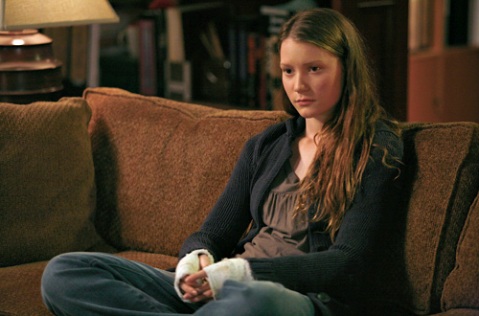
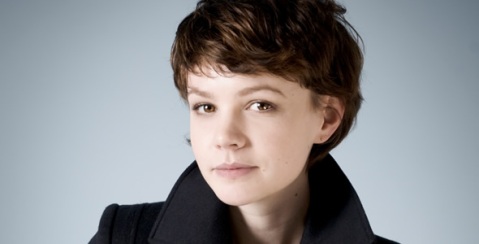
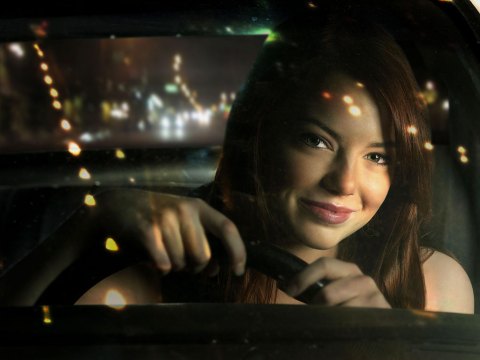
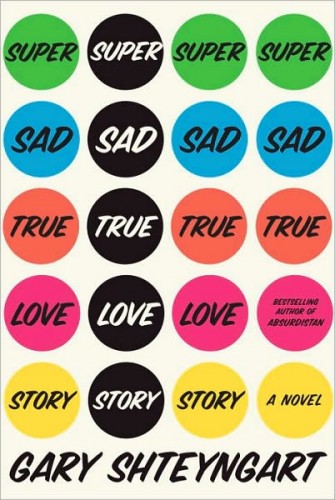
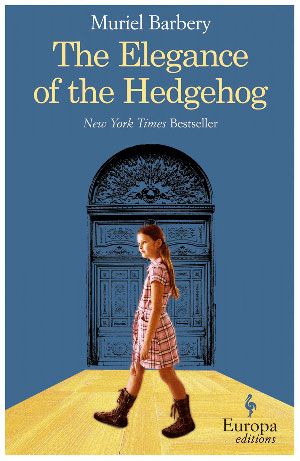 I’ve plunged myself into Muriel Barbery’s wonderful novel, The Elegance of the Hedgehog, which moves back and forth between the interior monologues of two brilliant women: the autodidact Renée, who hides behind her mask as an unkempt, sullen concierge in an elegant Paris apartment building; and Paloma, the precociously intelligent 12-year-old who lives upstairs and despises the pretentions of her family, teachers, and classmates. They seem to be on a path to discover one another — but I’m at the point in the novel when I’m so enjoying just listening to them think out loud that I’m not sure I care whether the narrative goes anywhere (Paloma has a diatribe about why grammar is about accessing the beauty of language that’s so wonderful I’m thinking of plagiarizing it for use in my classes).
I’ve plunged myself into Muriel Barbery’s wonderful novel, The Elegance of the Hedgehog, which moves back and forth between the interior monologues of two brilliant women: the autodidact Renée, who hides behind her mask as an unkempt, sullen concierge in an elegant Paris apartment building; and Paloma, the precociously intelligent 12-year-old who lives upstairs and despises the pretentions of her family, teachers, and classmates. They seem to be on a path to discover one another — but I’m at the point in the novel when I’m so enjoying just listening to them think out loud that I’m not sure I care whether the narrative goes anywhere (Paloma has a diatribe about why grammar is about accessing the beauty of language that’s so wonderful I’m thinking of plagiarizing it for use in my classes).







